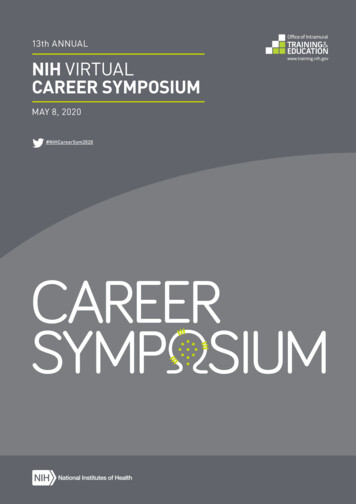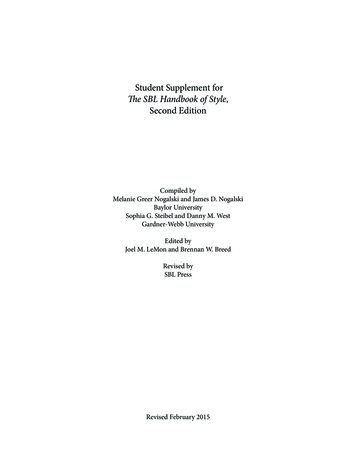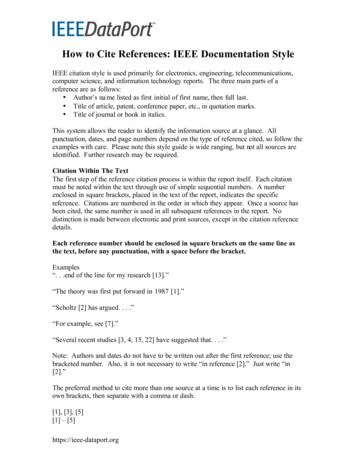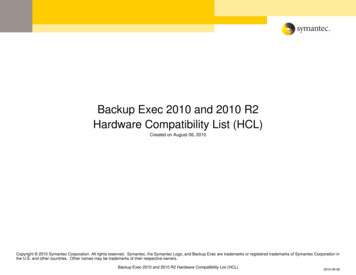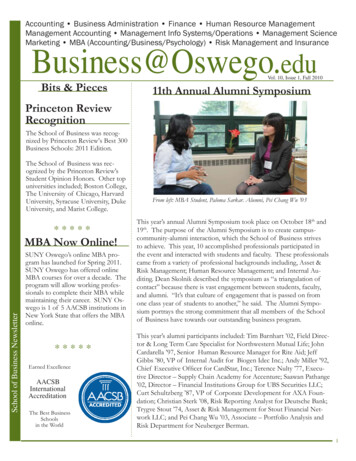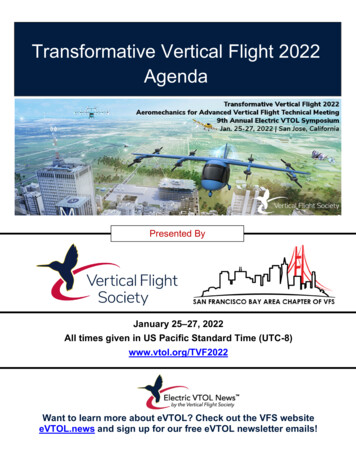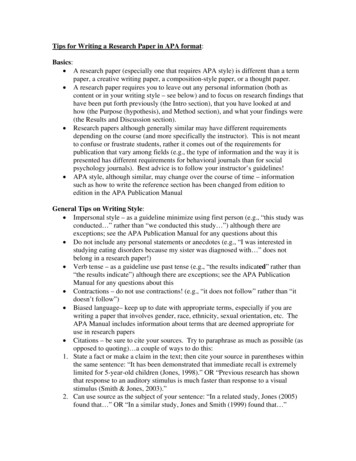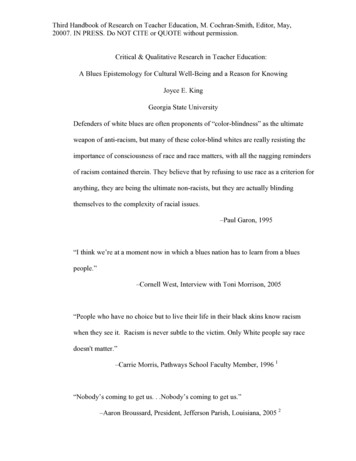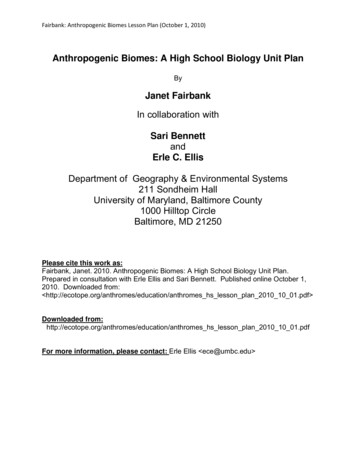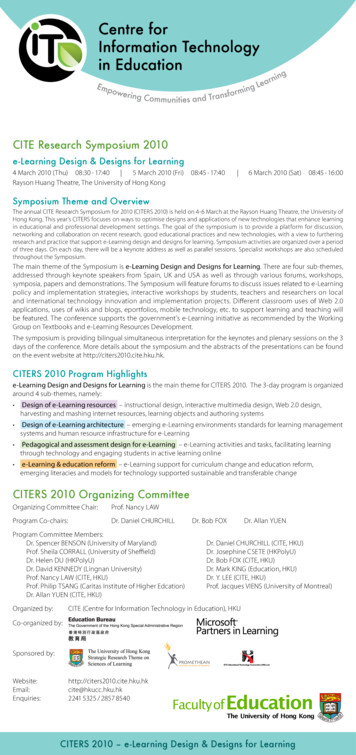
Transcription
CITE Research Symposium 2010e-Learning Design & Designs for Learning4 March 2010 (Thu) 08:30 - 17:40 5 March 2010 (Fri)Rayson Huang Theatre, The University of Hong Kong08:45 - 17:40 6 March 2010 (Sat)08:45 - 16:00Symposium Theme and OverviewThe annual CITE Research Symposium for 2010 (CITERS 2010) is held on 4-6 March at the Rayson Huang Theatre, the University ofHong Kong. This year’s CITERS focuses on ways to optimise designs and applications of new technologies that enhance learningin educational and professional development settings. The goal of the symposium is to provide a platform for discussion,networking and collaboration on recent research, good educational practices and new technologies, with a view to furtheringresearch and practice that support e-Learning design and designs for learning. Symposium activities are organized over a periodof three days. On each day, there will be a keynote address as well as parallel sessions. Specialist workshops are also scheduledthroughout the Symposium.The main theme of the Symposium is e-Learning Design and Designs for Learning. There are four sub-themes,addressed through keynote speakers from Spain, UK and USA as well as through various forums, workshops,symposia, papers and demonstrations. The Symposium will feature forums to discuss issues related to e-Learningpolicy and implementation strategies, interactive workshops by students, teachers and researchers on localand international technology innovation and implementation projects. Different classroom uses of Web 2.0applications, uses of wikis and blogs, eportfolios, mobile technology, etc. to support learning and teaching willbe featured. The conference supports the government’s e-Learning initiative as recommended by the WorkingGroup on Textbooks and e-Learning Resources Development.The symposium is providing bilingual simultaneous interpretation for the keynotes and plenary sessions on the 3days of the conference. More details about the symposium and the abstracts of the presentations can be foundon the event website at http://citers2010.cite.hku.hk.CITERS 2010 Program Highlightse-Learning Design and Designs for Learning is the main theme for CITERS 2010. The 3-day program is organizedaround 4 sub-themes, namely: Design of e-Learning resources – instructional design, interactive multimedia design, Web 2.0 design,harvesting and mashing internet resources, learning objects and authoring systems Design of e-Learning architecture – emerging e-Learning environments standards for learning managementsystems and human resource infrastructure for e-Learning Pedagogical and assessment design for e-Learning – e-Learning activities and tasks, facilitating learningthrough technology and engaging students in active learning online e-Learning & education reform – e-Learning support for curriculum change and education reform,emerging literacies and models for technology supported sustainable and transferable changeCITERS 2010 Organizing CommitteeOrganizing Committee Chair:Prof. Nancy LAWProgram Co-chairs:Dr. Daniel CHURCHILLDr. Bob FOXProgram Committee Members:Dr. Spencer BENSON (University of Maryland)Prof. Sheila CORRALL (University of Sheffield)Dr. Helen DU (HKPolyU)Dr. David KENNEDY (Lingnan University)Prof. Nancy LAW (CITE, HKU)Prof. Philip TSANG (Caritas Institute of Higher Edcation)Dr. Allan YUEN (CITE, HKU)Organized by:Dr. Daniel CHURCHILL (CITE, HKU)Dr. Josephine CSETE (HKPolyU)Dr. Bob FOX (CITE, HKU)Dr. Mark KING (Education, HKU)Dr. Y. LEE (CITE, HKU)Prof. Jacques VIENS (University of Montreal)CITE (Centre for Information Technology in Education), HKUCo-organized by:Sponsored by:Website:Email:Enquiries:Dr. Allan 2241 5325 / 2857 8540Faculty of EducationThe University of Hong KongCITERS 2010 – e-Learning Design & Designs for Learning
Design ofe-Learning resourcesDesign ofe-Learning architecturePedagogical and assessment designfor e-Learninge-Learning & education reformSI Simultaneousinterpretation4 March 2010 (Thursday)The first day sets the stage for policy and strategic considerations for e-Learning in school and higher education. In the morningthere is a forum to discuss various issues related to leading e-Learning integration in higher education as well as a workshopon using an intelligent microworld to learn algebraic thinking. In the afternoon, the first keynote address provides an overviewon perspectives and policies of ICT in education in Catalonia, Spain. The parallel paper presentation sessions report studiesof e-Learning in a wide variety of learning contexts. Concurrently, there is a workshop on assessing 21st century skills usingtechnology.Workshop: 09:00 - 10:30 @ RMS‑101Educational Resources for 21st Century SchoolsSpeaker: Mr. Jordi VIVANCOS (Head of the Knowledge and Learning Technologies Unit, the Council of Education of Catalonia, Spain)Chair :Dr. Allan YUEN (Associate Professor, Faculty of Education, HKU)Forum: 09:00 - 12:30 @ RHTLeading e-Learning Integration in Higher Education: Challenges and StrategiesSpeakers: Mr. Gerrit W BAHLMAN (Director of Information Technology, The Hong Kong Polytechnic University)Dr. Josie CSETE (Senior ED Officer, Educational Development Centre, The Hong Kong Polytechnic University)Prof. Alex FUNG (Director, Centre for Learning, Teaching and Technology, The Hong Kong Institute of Education)Dr. David KENNEDY (Director and Associate Professor, Teaching and Learning Centre, Lingnan University)Prof. Carmel MCNAUGHT (Director, Centre for Learning Enhancement And Research, The Chinese University of Hong Kong)Mr. Nick NOAKES (Director, Center for Enhanced Learning and Teaching, Hong Kong University of Science and Technology)Dr. M.C. PONG (Associate IT Director, Computer Centre, HKU)Dr. Eva WONG (Director, Centre for Holistic Teaching and Learning, Hong Kong Baptist University)Chairs:Dr. Bob FOX (Associate Professor, Faculty of Education, HKU) andDr. Daniel CHURCHILL (Assistant Professor, Faculty of Education, HKU)Workshop: 11:00 - 12:30 @ RMS‑104An Intelligent Microworld as an Alternative Way to Learn Algebraic ThinkingSpeaker: Prof. Richard NOSS (Professor of Mathematics Education & Co-director and Director of TLRP-TEL Research Programme, LondonKnowledge Lab, UK)Chair:Dr. Ida MOK (Associate Professor, Faculty of Education, HKU)SI 13:45 - 14:00 @ RHTOpening Ceremony and Welcoming Address Speakers: Mr. Kenneth CHEN, JP (Under Secretary for Education, Education Bureau, the Government of the HKSAR)Prof. Amy TSUI (Pro Vice-Chancellor & Vice President, Chair Professor (Chair of Language and Education), HKU)Presentation of souvenirs: Prof. Shirley GRUNDY (Dean, Faculty of Education, HKU)SI 14:00 - 15:00 @ RHTKeynote: Perspectives and Policies on Educational ICT in Catalonia, SpainSpeaker: Mr. Jordi VIVANCOS (Head of the Knowledge and Learning Technologies Unit, the Council of Education of Catalonia, Spain)Chair:Prof. Nancy LAW (Director, CITE, HKU)Workshop: What Should we Assess With Technology?Speaker: Dr. Barbara MEANS (Center for Technology in Learning, SRI International, United States)Chair:Dr. Y. LEE (Assistant Director, CITE, HKU)15:30 - 17:40 @ RMS‑101 & 104Paper Presentations (Part 1)15:30 - 15:50RMS‑204 Personalising English language teaching in secondary schools through technology – Part 1SZE, Paul M.M. (The Chinese University of Hong Kong); YEUNG, Li Wa Jenny; WONG, Sze Long ArmstrongRMS‑205 One-to-one: A model for transformation of ICT-use in Swedish schools?TALLVID, Martin (University of Gothenburg, Sweden); BJÖRN, Kristina; LINDSTRöM, Berner and LUNDIN, JohanRMS‑206 Educational blogfolio – exploring student teacher’s concepts and competency of integrating webapplications and blog features for knowledge constructionCHUI, Mike H.L. (The Hong Kong Institute of Education)16:10 - 16:3015:50 - 16:10RMS‑204 Personalising English language teaching in secondary schools through technology – Part 2SZE, Paul M.M. (The Chinese University of Hong Kong); YEUNG, Li Wa Jenny; WONG, Sze Long ArmstrongRMS‑205 Educational affordances of blogs in preservice teacher educationDENG, Liping (HKU); YUEN, AllanRMS‑206 From an online training course to a “virtual” teacher training academy – design and implementationof Peking University’s asynchronous online teacher training programGUO, Wenge (Peking University, Beijing)RMS‑204 Hosting a dynamic blog – a paradigm shift of collaborative knowledge construction by applyingWordPress themes and plug-insCHUI, Mike H.L. (The Hong Kong Institute of Education)RMS‑205 Enhancing critical thinking through an online debating curriculumGOH, Wendy Wee Lyn (Columbia University, New York)RMS‑206 Graphic rich animated courseware improves both e-Learning and understanding in physiology topicsof year 1 medical and non-medical undergraduate coursesHWANG, Isabel (The Chinese University of Hong Kong); LAM, Paul17:00 - 17:2016:40 - 17:00Paper Presentations (Part 2)RMS‑204 Wikis and blogs for collaborative English language learning activities for primary school students – Part 1SZE, Paul M.M. (The Chinese University of Hong Kong); YAU, Pik Kei Peggy; WONG, Hoi Lam; WONG, Kin MingRMS‑205 A study of viewing and representing meta-skills in interacting with digital multimodal textsKHOO, Kay Yong (HKU)RMS‑204 Wikis and blogs for collaborative English language learning activities for primary school students – Part 2SZE, Paul M.M. (The Chinese University of Hong Kong); YAU, Pik Kei Peggy; WONG, Hoi Lam; WONG, Kin MingRMS‑205 Evaluating the effectiveness of using blogs to promote narrative writing in upper primary Englishclass in Hong Kong schoolYING, Ngai Andrew
Design ofe-Learning resourcesDesign ofe-Learning architecturePedagogical and assessment designfor e-Learninge-Learning & education reformSI Simultaneousinterpretation5 March 2010 (Friday)The main theme for the second day is on e-Learning design. In the morning there are two sets of workshops running in parallel,one on the analysis of computer supported collaborative learning (CSCL) discourse, and the other comprising an introduction tothe development of the open source learning management system, Moodle, followed by presentations and discussions of goodpractices in higher education via e-Learning. In the afternoon, the second keynote examines findings from research and practicein technology enhanced learning in the UK context. The parallel sessions include a forum to examine, at the policy level, whatkind of strategies for human and technology infrastructure would be important for successful implementation of e-Learningadoption for transforming education in schools, workshops and paper presentations.Workshop: Moodle: Past, Present, FutureSpeaker: Mr. Shane ELLIOTT (Core Moodle developer and Director , Pukunui Technology, Western Australia)Chair :Dr. Daniel CHURCHILL (Assistant Professor, Faculty of Education, HKU)09:00 - 10:30 @ RHTWorkshop: 09:00 - 12:30 @ RMS‑206Multiple Methods and Techniques in Analyzing Computer-Supported Collaborative Learning (CSCL) DataSpeakers: Dr. Kwok Ping CHAN (Associate Professor, Department of Computer Science, HKU)Dr. Yanyan LI (School of Educational Technology, R&D Center for Knowledge Engineering, Beijing Normal University, China)Dr. Jingyan LU (Research Assistant Professor, Faculty of Education, HKU)Dr. Ming LAI (Postdoctoral Fellow, Faculty of Education, HKU)Mr. Johnny YUEN, Ms. Jing LENG, Ms. Wing WONG (Research students, Faculty of Education, HKU)Prof. Nancy LAW (Director, CITE, HKU)Chair:Dr. Jingyan LU (Research Assistant Professor, Faculty of Education, HKU)Workshop: 11:00 - 12:30 @ RMS‑101 & 104Designing e-Learning in Higher Education: Practice CasesSpeakers: Dr. Diane SALTER (Associate Professor, Centre for the Enhancement of Teaching and Learning, HKU)Dr. Susan BRIDGES (Assistant Professor, Faculty of Dentistry, HKU)Mr. Ian BROWN (ED Officer, Educational Development Centre, The Hong Kong Polytechnic University)Mr. Peter DUFFY (ED Officer, Educational Development Centre, The Hong Kong Polytechnic University)Chair:Dr. Bob FOX (Associate Professor, Faculty of Education, HKU)SI 14:00 - 15:00 @ RHTKeynote: Challenges for Research and Practice in Technology Enhanced Learning: Emerging Themes from the UK TEL ResearchSpeaker: Prof. Richard NOSS (Professor of Mathematics Education & Co-director and Director of TLRP-TEL Research Programme, LondonKnowledge Lab, UK)Chair :Dr. Allan YUEN (Associate Professor, Faculty of Education, HKU)SI 15:30 - 17:40 @ RHTForum: Leading e-Learning Adoption in Schools: Human and Technological Structures and StrategiesSpeakers: Mr. Jordi VIVANCOS (Head of the Knowledge and Learning Technologies Unit, the Council of Education of Catalonia, Spain)Dr. Norrizan RAZALI (Senior Manager, Smart School Department, Multimedia Development Corporation, Malaysia)Prof. Ray HUANG (Distinguished Professor, Department of Engineering Science, National Cheng Kung University, Taiwan)Prof. Ronghuai HUANG (Deputy Dean, Faculty of Education, Beijing Normal University, China)Prof. Geng CHEN (Dean, Distance and Continuous Education, Beijing Jiaotong University, China)Chair :Mr. SHE Mang (Chief Curriculum Development Officer (IT in Education), Education Bureau, the Government of the HKSAR)工作坊: 無處不在的學習空間 – 數碼遊蹤講 者: 李志成主任 及 郭靜妍老師 (保良局朱正賢小學)15:30 - 16:30 @ RMS-101工作坊: 15:30 - 17:40 @ RMS-104建立個人化學習 – 真正的電子書包OneNote講 者: 劉偉基先生(Microsoft Hong Kong Limited 客戶技術專員) 及 劉耀麒先生(Microsoft Hong Kong Limited 教育方案專員)15:30 - 15:50RMS‑205 Digital educational game: pedagogical design and developmentHODGSON, Paula (HKU); MAN, Donald; FONG, Agnes16:10 - 16:30RMS‑205 Learning application software: conventional versus screencasts approachYONG, Su Ting (The University of Nottingham Malaysia Campus, Malaysia)15:50 - 16:10Paper Presentations (Part 3)RMS‑206 �研報告吳峰(北京大學)RMS‑206 M-learning object for Chinese character learningMA, Hilda (HKU); YAN, Jingjing JuliaRMS‑205 “So far, yet so near. So near yet so far”: get IT rightKANG, Tsi Kit (The Nurturing Education)RMS‑206 Application and evaluation of advanced simulation with HPS in developing student’s critical thinkingdispositions and skills: the progressCHIANG, Vico Chung Lim (HKU)17:00 - 17:2016:40 - 17:00Paper Presentations (Part 4)RMS‑205 Educational computer games: what are the students’ expectations?YONG, Su Ting (The University of Nottingham Malaysia Campus)RMS‑206 Conceptual learning through learning objects: application in Mathematics classrooms in secondaryschoolsCHIU, Kin Fung Thomas (SKH Holy Trinity Chruch Secondary School)RMS‑205 Instructors’ adoption and implementation of Moodle in higher educationLEI, Chunlin (HKU / Shanghai Institute of Foreign Trade)RMS‑206 Social bookmarking services: an empirical analysis on Connotea – users’ perspectiveCHU, Sam (HKU); DU, Helen; GORMAN, Gery
Design ofe-Learning resourcesDesign ofe-Learning architecturePedagogical and assessment designfor e-Learninge-Learning & education reformSI Simultaneousinterpretation6 March 2010 (Saturday)The third day focuses on e-Learning in schools. The keynote examines pedagogical and assessment design for online learning.This is followed by parallel sessions consisting of paper presentations and a number of school-based workshops on knowledgebuilding, developing e-Learning platforms in the international school context, e-Learning by Microsoft Partners in Learning aswell as the use of an online assessment platform to support enquiry learning in the NSS subject Liberal Studies. After lunch, thefinal plenary reviews the policies and practices about e-Learning and discusses how the efforts from different societal sectorscan be aligned to leverage e-Learning for Education in the 21st Century.Keynote: Pedagogical and Assessment Design for Online LearningSpeaker: Dr. Barbara MEANS (Center for Technology in Learning, SRI International, United States)Chair:Dr. Bob FOX (Associate Professor, Faculty of Education, HKU)SI09:00 - 10:00 @ RHT工作坊: �及評估而建的網上學習平台工作坊 10:30 - 12:30 @ RMS‑101講 者: ��生(妙法寺陳呂重德紀念中學) 及林佩儀老師(風采中學)工作坊: 建立個人化學習 – 真正的電子書包OneNote(重覆) 10:30 - 12:30 @ RMS-104講 者: 劉偉基先生(Microsoft Hong Kong Limited 客戶技術專員) 及 劉耀麒先生(Microsoft Hong Kong Limited 教育方案專員)工作坊: 提昇新世代高階思維 – 知識建構師生網絡 講 者: 知識建構教師發展網絡成員小組 (CITE, HKU)10:30 - 12:30 @ RMS‑206Workshop: Developing e-learning Platforms in SchoolsSpeaker: Mr. Paul WHITE (Learning Technology Adviser, English Schools Foundation)10:30 - 11:30 @ RMS‑402Workshop: Contemporary Teachers and Students Should Be Using Contemporary ToolsSpeakers: Saeed RAHMAN, Makky FUNG and John D’ARCY (Canadian International School of Hong Kong)11:30 - 12:30 @ RMS‑402Workshop: 13:45 - 14:45 @ RMS‑206Knowledge Building Teacher Network: Teacher & Student Co-construction of Knowledge throughInternational CollaborationSpeaker: KBTN Project Team (CITE, HKU)Paper Presentations (Part 5)10:30 - 10:50RMS‑403Designing a web-based collaborative inquiry and modeling environment for science learningZHANG, Baohui (Learning Sciences Lab, Nanyang Technological University, Singapore); WU, Longkai; LOW, Poh Lian10:50 - 11:10RMS‑403Building a blended learning community: a case in service marketingHODGSON, Paula (HKU); KWOK, Pamela11:10 - 11:30RMS‑403Assessment of crisis management training through online role play simulationLEUNG, Lawrence (HKU)Paper Presentations (Part 6)11:30 - 11:50RMS‑403A critical review on the use of e-materials in General Studies to enhance students’ interest of learningCHAU, Tin Yee (Ma Tau Chung Government Primary School)11:50 - 12:10RMS‑403An algorithm for piano pedagogy through MIDI protocol and computer softwareCHENG, Lee (HKU)12:10 - 12:30RMS‑403Investigating undergraduate student mobile device use in contextSONG, Yanjie (HKU)Paper Presentations (Part 7)13:45 - 14:05RMS‑101 Moving from reform to transformation by e-LearningLEUNG, Ho Chung (CCC Kung Lee College)RMS‑104 The system architecture of an interactive e-Learning platform integrated with Web 2.0 technologiesTAM, Vincent (HKU)RMS‑402 A case study on corpus-based pedagogical processingTANG, Jie Yi (South China Normal University)RMS‑403 Integrating a digital library into the school e-Learning environmentDUKIC, Dana (English Schools Foundation)14:05 - 14:25RMS‑101 A corpus perspective of phraseology to advanced English reading classXU, Manfei (South China Normal University)RMS‑104 Using technology to support development of research skills for primary school studentsCHURCHILL, Natalia (Singapore International School); NG, Mei Yun; ANG, Mei Ling; LAM, Edwina; HO, ElaineRMS‑402 New students’ perception and prevalence of traditional and internet assisted academic dishonesty ininstitutions of higher learningTHONG, Lee-Fah (The University of Nottingham Malaysia Campus)RMS‑403 Leaps of creativity: futuristic inventions by Hong Kong studentsTAN, Bernard (University of Saint Joseph, Macau)SI 14:45 - 16:00 @ RHTFinal Plenary & Closure: How can the Efforts from Different Societal Sectors be Aligned to Leverage e-Learning for Education in the21st Century?Speakers: Mr. Kenneth CHEN, JP. (Under Secretary for Education, Education Bureau, the Government of the HKSAR)Prof. K.M. CHENG (Senior Advisor to the Vice-Chancellor, HKU)Dr. Barbara MEANS (Center for Technology in Learning, SRI International, United States)Prof. Richard NOSS (Professor of Mathematics Education & Co-director and Director of TLRP-TEL Research Programme, LondonKnowledge Lab, UK)Chair:Mr. Jordi VIVANCOS (Head of the Knowledge and Learning Technologies Unit, the Council of Education of Catalonia, Spain)Prof. Nancy LAW (Director, CITE, HKU)
AbstractsKEYNOTES & PANEL DISCUSSIONSPerspectives and Policies on Educational ICT in Catalonia, Spain Mr. Jordi VIVANCOSThe Catalan government is committed to the development of ICT strategies and policies that promote pedagogical innovationand education improvement. The presentation will highlight the current ICT educational agenda and related initiatives inCatalonia – the School 2.0 and 1:1 laptop programs, along with their strategic implications. It will address various dimensions ofthis major innovation process at macro and meso levels, including in-service teacher training, educational content provision andschool e-maturity self diagnosis. It will examine how these ambitious ICT plans achieve a vision characterized by transformativeePedagogy, and not merely technological deployment.Challenges for Research and Practice in Technology Enhanced Learning: EmergingThemes from the UK TEL Research Prof. Richard NOSSThis keynote will describe the work of an ambitious 4-year Technology Enhanced Learning (TEL) research programme in theUK (www.tlrp.org/tel) and present some interim results as well as emerging themes relevant to practitioners and researchersfrom the work. The programme is funded for four years jointly by two UK Research Councils (the Engineering and PhysicalSciences Research Council – which handles Computer Science research – and the Economic and Social Research Council – whichincludes Education). This program seeks genuine innovation in both the learning sciences and computer science, and to achieveinterdisciplinary collaboration that tackles issues of research design and the transformation of practice.Pedagogical and Assessment Design for Online Learning Dr. Barbara MEANSFormative assessment of students’ understanding and skills during the course of instruction is one of the most powerful toolseducators have to strengthen learning outcomes. A new generation of online learning is demonstrating how we can leveragethe power of formative assessment by integrating learning and assessment activities. Non-conventional designs capture studentchoices, reflections, and requests for assistance as well as student responses to assess and diagnose student understanding andcompetence. These measures are embedded within entirely online and blended instruction activities such as exploring a virtualworld, conducting online science laboratory experiments, and constructing mathematical proofs. With these online formativeassessment approaches, both the learner and the instructor receive much more timely, usable feedback.How can the Efforts from Different Societal Sectors be Aligned to Leverage e-Learningfor Education in the 21st Century? Final Plenary & ClosureThis panel discussion is designed to be a platform for conference participants to share their thoughts on how to enhancee-Learning developments in Hong Kong, drawing on the various conference events and participants’ own experiences.FORUMSLeading e-Learning Integration in Higher Education: Challenges and StrategiesWhile all universities in Hong Kong are engaged in major curriculum reform, they are also reviewing their online services,resources and approaches to teaching and learning with technology. The forum panel, composed of staff from sevenuniversities in Hong Kong, will discuss challenges and strategies planned to help prepare their institutions for an increasing roleof e-Learning to support the new curriculum.Leading e-Learning Adoption in Schools: Human and Technological Structures andStrategiesFor e-Learning integration to take on effectively the role of transforming school education to meet the challenges of preparingstudents for the 21st century, it takes much more than investment into hardware, software, digital resources and technicalcompetence. The leadership, management and support structure at various levels from the central government educationauthority to district, school and subject panel levels are crucial success factors. Each invited speaker will give a brief descriptionof the national e-Learning initiative they are in charge of, and on this basis, reflect on the above issues and the lessons learnt.SPECIALIST WORKSHOPSEducational Resources for 21st Century Schools Mr. Jordi VIVANCOSThis workshop is intended for those interested/involved in the development/production or policy support for digital learningresources. Issues addressed in this workshop include taxonomies of educational resources, digital content production models,e-Learning standards, delivery platforms and European trends on digital content.An Intelligent Microworld as an Alternative Way to Learn Algebraic Thinking Prof. Richard NOSSThis workshop will give an opportunity to interact with a microworld, the eXpresser, which lies at the heart of the MiGen project,currently underway at the London Knowledge Lab, in the University of London. The project is tackling a thorny problem thatconfronts all teachers of mathematics: What is algebra for? How is it useful for expressing generalizations? What does it mean togeneralise in mathematics?What Should we Assess With Technology? Dr. Barbara MEANSMoodle: Past, Present, Future Mr. Shane ELLIOTTModern technology offers a whole new set of possibilities for student assessment, particularly as more schools have thecapability to provide one-to-one student online access to technology. This workshop will explore examples such as those fromthe U.S. National Assessment of Educational Progress Technology-based Assessment Project, Professor John Bransford’s group atthe University of Washington, and from the ChemFacets project at the Center for Technology in Learning at SRI. Issues related tothe frameworks and approaches to the assessment of e-Literacy will be explored.Moodle is an open source internet-based course (learning) management system that is used by teachers working alone, schools,training organisations, government agencies, and universities. It is an ongoing development project designed to support asocial constructionist framework of education. This presentation will focus on the origins of Moodle, the community and largesupport base available, and a look at the new Moodle 2.0 to be released mid 2010.Designing e-Learning in Higher Education: Practice CasesThe workshop explores three different studies and practices in the design and use of e-Learning in higher education. The firstspeaker reviews 36 international award winning teacher beliefs and approaches to using technology to support student learning.The second reports on a Teaching Development Grant (TDG) project and how one Faculty is using a blend of interactivetechnologies to support a problem-based curriculum. The final two speakers showcase case studies of good practices ine-Learning at the HK PolyU.Multiple Methods and Techniques in Analyzing Computer-Supported CollaborativeLearning (CSCL) DataThis workshop brings researchers with different backgrounds and research interests to share their experiences in CSCL dataanalysis. The presentations of the workshop include the following topics: Question classification and sentiment analysis,Semantic forum for collaborative learning, Sequential discourse analysis of CSCL online data and Visualizations of multipleautomated analyses.
Program OverviewSession titles written in English will be conducted in English. Session titles written in Chinese will be conducted in Cantonese. Simultaneous interpretation between English and Putonghua is available for keynotes & sessions markedSI .4 March 2010 (Thursday)08:30 - 09:00Registration 09:00 - 10:30Workshop: Educational Resources for 21st Century@ RMS‑101Schools 10:30 - 11:00Tea Break 11:00 - 12:30Workshop: An Intelligent Microworld as anAlternative Way to Learn Algebraic Thinking@ RHT-foyerForum: Leading e-Learning Integration in HigherEducation: Challenges and Strategies – Part I @RHT@ RHT-foyer Forum: Leading e-Learning Integration in HigherEducation: Challenges and Strategies – Part 2 @ RHT@ RMS‑10412:30 - 13:30Lunch13:30 - 13:45Registration 13:45 - 14:00Opening Ceremony & Welcoming address SI@ RHT14:00 - 15:00Keynote: Perspectives and Policies on Educational ICT in Catalonia, Spain SI@ RHT15:00 - 15:30Tea Break 15:30 - 16:30Paper Presentations @ RMS‑204, 205, 20616:40 - 17:40Paper Presentations @ RMS‑204, 205@ RHT-foyer@ RHT-foyerWorkshop: What Should we Assess WithTechnology? @ RMS‑101 & 1045 March 2010 (Friday)08:45 - 09:00 Registration 09:00 - 10:30@ RHT-foyerWorkshop:Moodle: Past, Present, Future @ RHT10:30 - 11:00Tea Break 11:00 - 12:30Workshop: Designing e-Learning in Higher@ RMS‑101 & 104Education: Practice Cases Workshop: Multiple Methods and Techniques inAnalyzing Computer-Supported CollaborativeLearning (CSCL) Data – Part 1 @ RMS‑206@ RHT-foyerWorkshop: Multiple Methods and Techniques inAnalyzing Computer-Supported CollaborativeLearning (CSCL) Data – Part 2 @ RMS‑20612:30 - 13:45Lunch13:45 - 14:00Registration 14:00 - 15:00Keynote: Challenges for Research and Practice in Technology Enhanced Learning: Emerging Themes fromSI @ RHTthe UK TEL Research 15:00 - 15:30Tea Break 15:30 - 16:30Paper Presentations 16:40 - 17:40@ RHT-foyer@ RHT-foyer@ RMS‑205, 206Paper Presentations 工作坊:無處不在的學習空間 –@ RMS‑101數碼遊蹤 @ RMS‑205, 206Forum:Leading e-LearningAdoption inSchools: Human andTechnological Structuresand Strategies SI @ RHT工作坊:建立個人化學習 – 真正的電子書包OneNote @ RMS‑1046 March 2010 (Saturday)08:45 - 09:00Registration 09:00 - 10:00Keynote: Pedagogical and Assessment Design for Online Learning 10:00 - 10:30Tea Break 10:30 - 11:3011:30 - 12:30@ RMS‑403Paper Presentations SI@ RHT@ RHT-foyerPaper Presentation @ RHT-foyer@ RMS‑403Workshop:Developinge-LearningPlatforms inSchools @ RMS‑402工作坊:建立個人化學習– 真正的電子書包OneNote(重覆) @ RMS‑104工作坊:提昇新世代高階思維 – 知識建構師生網絡 @ RMS‑206Workshop:ContemporaryTeachers andStudents ShouldBe UsingContemporaryTools @ 平台工作坊 @ RMS‑10112:30 - 13:30Lunch @ RHT-foyer13:30 - 13:45Registration @ RHT-foyer13:45 - 14:45Paper Presentations 14:45 - 16:00Final Plenary & Closure: How can the Efforts from Different Societal Sectors be Aligned to Leveragee-Learning for Education in the 21st Century? RMSRHTRHT-foyer@ RMS‑101, 104, 402, 403Runme Shaw Building 邵仁枚樓 Rayson Huang Theatre 黃麗松講堂The Foyer of Rayson Huang Theatre 黃麗松講堂大堂Workshop: Knowledge BuildingTeacher Network: Teacher & StudentCo-construction of Knowledge throughInternational Co
e-Learning Design and Designs for Learning is the main theme for CITERS 2010. The 3-day program is organized around 4 sub-themes, namely: Design of e-Learning resources – instructional design, interactive multimedia design, Web 2.0 design, harvesting and mashing internet resources
